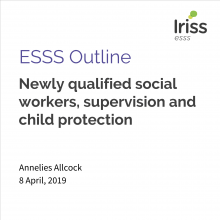This report describes the rationale, process and learning from a project led by Iriss which explored the topic of supervision with a group of six partners from across the social services sector. The purpose of this report is to share the learning gathered through the project to provide some evidence, inspiration, and pointers for those interested in improving supervision. Key points from the report can be used to prompt reflection and discussion with teams, to review current supervision practice and to help plan improvements.
Each project partner experienced a range of challenges to their plans, however, all were able to make progress, to identify enablers and key learning points. Partner's experiences are explored through five case studies which can be found in section six of the report. The case studies, based on in-depth interviews, provide a snapshot of each partner's context, and detail the challenges and enablers they encountered.
Case study one describes the rationale for group supervision in a service supporting adults with disabilities, one service as part of a large third sector organisation. This case study looks at the importance of adapting supervision policy more closely to practice.
Case study two is based in a private care home setting and details the challenges associated with organisational instability. It also describes steps forward enabled by leadership.
Case studies three, four and five are taken from local authority settings.
Case study three explores the development of group supervision and the impact of organisation restructure.
Case study four focuses on the collaboration between learning and development and practice, to change the culture of group supervision in a reablement team.
Case study five describes learning about the gap between supervision policy and practice.
To complement this report, an Iriss Insight was commissioned: Achieving effective supervision. It summarises key research evidence and draws out implications for practice.
10 learning points from the project:
- Effective supervision is heavily dependent on the practice context and environment in which it takes place
- Varying perceptions, attitudes and experiences of supervision in organisations can hamper efforts to make changes. Negative experiences of supervision are common.
- Informal support is highly valued but under-evidenced
- A common challenge is to understand and bridge the gap between supervision policy and supervision practice
- Where supervision policies lack relevance to the realities of practice implementation can be challenging
- Linking supervision closely to personal development and a focus on outcomes (for both staff and people accessing support) can help add relevance between the policy and practice
- Adapting a policy to local contexts is recognised as important but more guidance, tools and support are needed around this
- Project partners expressed uncertainty around having 'permission' from their organisations, regulators and inspectors to change supervision policies and practice
- Leadership and buy-in from senior management is important, not just to approve changes to policies but to actively engage with and model meaningful supervision practice
- Partnerships across different roles in an organisation can help facilitate change in supervision









